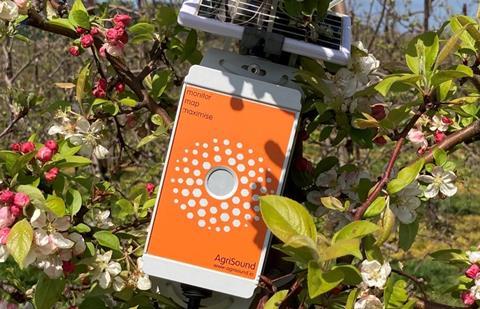Insect tracking tech rolled out on three Kent apple orchards, providing real-time data on precious pollinator activity

Tesco and WWF have teamed up with start-up tech innovator AgriSound to roll out its ground-breaking insect-monitoring device Polly across several English apple orchards.
The technology will give UK fruit growers game-changing insights into the activity of their precious pollinators.
Funded through the WWF and Tesco’s Innovation Connections Programme, 50 of the AI listening devices, designed to capture and analyse the sound of a range of common pollinating insects, have been deployed across three different sites in Kent.
The aim is to measure the biodiversity benefits of wildflower margins across three large commercial apple orchards, and their impact on pollination.
AgriSound anticipates that, by identifying areas of low pollinator activity in real time, the devices will support growers to boost biodiversity at key sites on their farms, to drive up pollinator numbers – and ultimately crop yields.
Data from the devices will also enable farmers to measure the change in pollinator numbers over time, helping to evaluate the benefits of farm-level interventions to boost pollinator numbers, helping to enhance biodiversity and reduce the need for artificial fertilisers or pesticides.
The Innovation Connections Programme aims to support the roll-out of innovative technologies designed to tackle the climate and nature crises into and across Tesco supply chains.
Thanks to the programme, AgriSound is working in partnership with AMFRESH, one of Tesco’s key fresh fruit suppliers, which sources fruit from a number of farms across Kent and the South East of England.
Casey Woodward, founder and CEO of AgriSound, said: “At a time when biodiversity, including pollinating bee populations, is declining rapidly and the cost of food production is soaring, our project, funded by Tesco and the WWF, could help revolutionise the efficiency of commercial pollination, allowing modern farming techniques to enhance vital biodiversity, rather than negatively impact it, as has sometimes been the case historically.
“It is exciting to be able to expand our technology in the Tesco fruit supply chain to help growers encourage pollinators to the right areas at the right time, boosting yields, without the need for additional fertilisers or pesticides.”
David Edwards, director of food strategy at WWF, added: “The UK is one of the most nature-depleted countries in the world, and currently food production is driving it’s decline. From insects and birds to bees and mammals, UK nature is in freefall – and this is undermining the resilience of our whole food system.
“New technology like this has the potential to support farmers to bring our landscapes back to life, helping to showcase measurable biodiversity benefits delivered through specific on farm interventions, at the same time as boosting productivity.”
The UK has seen dramatic declines in insect numbers in recent years, driven by a range of factors, including pesticide use.



